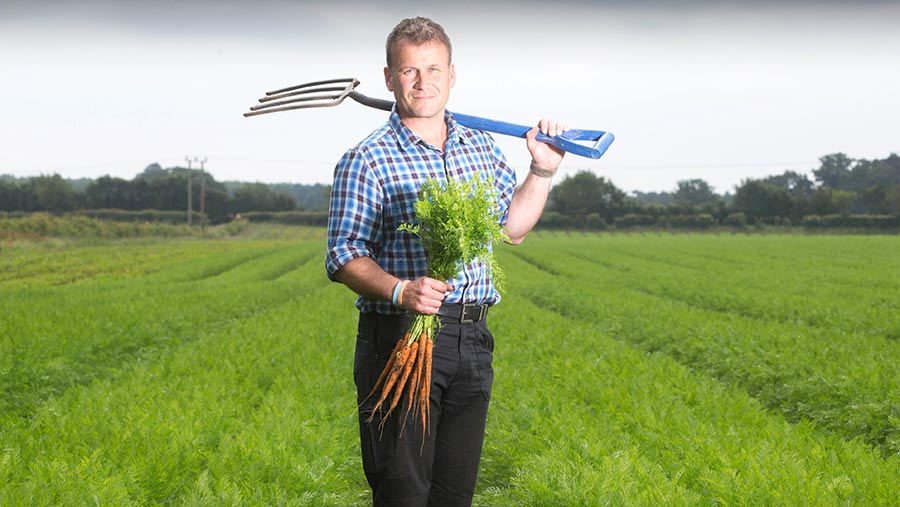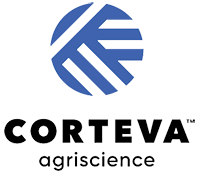Farmers Weekly Awards 2018: Farm Manager of the Year
 Mike Shapland © Tim Scrivener
Mike Shapland © Tim Scrivener Suffolk farm manager Mike Shapland is the Farmers Weekly 2018 Farm Manager of the Year.
Attention to detail is a quality all employers would look for in a manager.
Growing more than 30 crops, managing a staff of up to 80 and many blocks of land rented within a 35-mile radius of the home farm, Mike is definitely a details man.
The huge range of produce demands a rotational juggling act and military planning.
See also: Meet the 2018 Farm Manager of the Year finalists
Mike Shapland
James Foskett Farms, Woodbridge, Suffolk

Mike Shapland © Tim Scrivener
Farm facts
- Very diverse vegetable cropping across 880ha, some cereals and sugar beet
- Main crops – potatoes, onions and carrots
- Organic potatoes, onions, beetroot, French beans, sweetcorn, butternut squash, beetroot, courgettes on more than 200ha
- Light, free-draining irrigated grade 4 sandy loam soils; coastal climate allows early season production
In the eight years since he joined James Foskett Farms, Mike has dramatically increased the organic enterprise and oversaw a rise in cropped area and huge investment in storage, a new workshop and staff facilities.
Marketing
Profit from high-risk crops can fluctuate wildly from season to season. Mike manages price risk by having as much as possible on fixed-price contracts and marketing potatoes and onions through a co-op and a producer organisation (PO) respectively to add value.
The ware potatoes are mainly earlies and are 70-75% contracted pre-season.
Marketing the growing volume of organic produce, including to national box schemes and farm shops, demands much of his time. The business also has many individual seed potato customers.
Organic production is also largely priced before planting. The risk here is not in the price, but in production volume, quality and production costs.
Staff
Mike is proud of his staff and the fact that several have been promoted internally to manager level.
Up to 60 seasonal workers are taken on for the peak season, mostly from Romania.
A comprehensive training plan motivates staff, with courses ranging from crop storage to management and leadership. Health and safety good practice is integral to day-to-day operations, evidenced by a thorough induction process.
Regular meetings keep the team informed about business performance, plans, and health and safety.
The demands of a business of this complexity mean that working schedules are sent daily by text, so everyone knows who is working on what and where.
It’s a concern that moving huge kit on local roads could cause neighbourhood issues, so movements are often done several hours before normal daytime traffic begins, and Mike ensures staff are considerate road users.
The farm hosts visits for a range of groups, from students to local farmer discussion groups and growers from other countries.
Technology and innovation
Capital spending plans for machinery and equipment are driven by Mike, with the larger investment decisions such as the recent new store, workshop and staff facilities made in conjunction with his fellow director and employer, James Foskett.
Recent investment includes a new Tillerstar cultivator for better-quality crops and less damage, without the cost of traditional destoning.
Machinery is mainly owned, with a significant proportion – including destoners, tractors and cultivators – bought second-hand
In-house machinery manufacturing includes a system for in-season injection of liquid fertiliser for potatoes and onions, as well as an inter-row gas weed burner, which recently emerged from the workshop and is working well.
The move into organics has informed practice on the conventional crops, so that far more mechanical weeding is now done on these than before the organic side was established.
Looking ahead
Despite rapid expansion in the past few years, Mike is aiming for another 25-35% rise in turnover over the next five years, with continued development of the organic enterprise and steady growth in the potato business.
If access to non-national seasonal labour becomes more difficult, he would like to employ more local labour, but if this is not possible, further mechanisation is likely to result.
Winning ways
- Excellent staff management – recognises talent, promotes internally and delegates
- Very innovative – adapting existing farm machinery, investing in latest technology, trying new crops
- Strong financial acumen, good understanding of risk and markets
- Managing expansion of organic area to satisfy growing demand
- Oversaw significant investment in crop storage
- Benchmarks with other growers
A word from our independent judge
“Mike recognises talent in his large team and rewards it with responsibility, allowing him to delegate in this complex business. He is an innovator with strong financial acumen and a drive to succeed.”
Charles Matts
The Farmers Weekly 2018 Farm Manager of the Year is sponsored by Corteva
 The other finalists are:
The other finalists are:
- Andrew Mahon, The Bromborough Estate, Wellingborough, Northamptonshire
- Chris Singer, Carington Estates, Bledlow, Buckinghamshire
